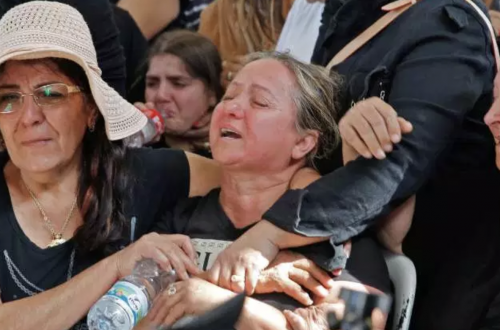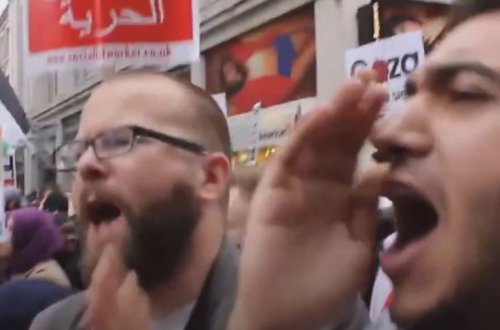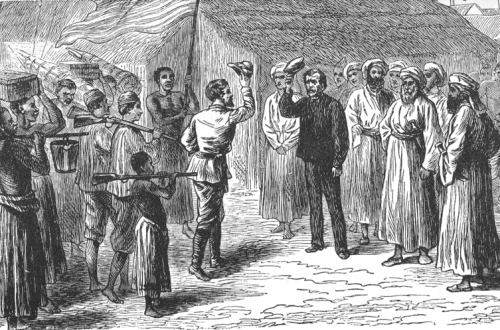In the United Kingdom it’s the Labour Party conference. The new leader of the party who was recently elected with a landslide victory is a hard left wing fellow named Jeremy Corbyn. He has made news for all of the wrong reasons. In short for associating with any number of Hamas and Hezbollah terrorists as well as Holocaust deniers and anti-Semites.
It’s scary to have a prominent politician with such a bizarre list of compadres and allies. There has been no shortage of column inches devoted to the fear felt by the Jews in the UK and various other parts of the world. Anti-Semitism is on the rise, we all know it and we’re not quite sure what to do about it. Except talk about how afraid we Jews are of it.
It makes me think back to Irwin Shaw’s short story Act of Faith. In the story a Jewish soldier has to deal with his own fears of anti-Semitism at the close of World War II. I came across this story (originally published in the New Yorker in 1946) in a book of war stories. Shaw wriggled his way inside my Jewish soul and got the heart of my own fears as a Jew growing up at the very end of the 20th century, so many decades after he wrote the story.
The protagonist Seeger, had killed a German SS officer and taken his Luger. He planned to take it back to the USA with him and keep it as a trophy, as a symbol of the justice he, the Jew, had been a part of when he killed the SS man by shooting him in the face. Over the course of the story he worries that he won’t be needing the weapon as a trophy but as a weapon with which to protect his own family from the Jew haters living all around him. He reflects on the experiences of anti-Semitism he endured from his own side in the US Army and fears for his future. In the end he understands that in such a situation the only weapon worth having is friendship with the people around him. The gun won’t save him but his friends could.
Written before Israel existed and read by me before I made aliyah Shaw managed to get right to the heart of the challenge facing the Jews. Who is your enemy and how do you deal with the never ending hatred emanating from him?
I am reminded of a night years ago in London, I had taken a night bus home from the city centre to the suburbs of Jewish North London some time around 2am. The top floor is where people get hurt, where the muggings and attacks on British buses take place. You get the night bus until you have enough money to get a cab. Sitting there looking at all the people talking and shouting. The 17 year old me stood on the second floor of the double decker bus, hands balled up into fists, “there’s a Jew on the bus, anyone got a problem with that?” I shouted.
I realised my mistake only when the bus went quiet and no one would make eye contact with me.
There were no anti-Semites on the bus, only in my head. The Jew’s plight, stand and fight only to swing a punch at a ghost, stay silent and do nothing only to feel the hatred rising all around you.
Anti-Semitism is a ghost, all around us and nowhere. You won’t see him but you’ll feel him. You won’t hear his voice but you’ll feel his hatred. In every look, in every question, in every action. You might know but be unable to convince anyone, you might be able to make someone believe you but they won’t do anything.
When the anti-Semitic “comedian” Dieudonne was barred from performing in certain French cities thousands marched to support his rights. Had he been allowed to perform thousands would have helped him peddle his anti-Semitic brand of Jew hating comedy.
By the time I moved to Israel I was sick and tired of the invisible enemy. The enemy who had so callously, easily infiltrated my mind and stimulated my fear receptors. Perhaps that was why joining the IDF was so incredibly important. I wanted to be the man the anti-Semites were scared of not vice versa. But really I was still that 17 year old standing on the bus with his hands balled up in fists, ready to fight an enemy who wasn’t really there and all the while unable to find the real enemy who was blowing up buses and murdering with abandon.
It always affected me that Baruch Goldstein, the man who murdered dozens of Palestinians in Hebron walked around with the yellow star from the Holocaust on him. That kind of aggressive victimhood was the same thing that had me behaving so irrationally on the bus. The certainty that the hatred was out there, haunting me, stalking me. It led to an aggressive burst of victimhood. So desperate to leave behind the enemies in my mind that I was ready to attack in real life.
And so the choice offered to Jews in this 21st century is, like Shaw’s protagonist, Seeger, to place your trust in your non-Jewish friends and hope that their love for you will be enough to displace the hatred around you. Or to move to Israel and hope that your resilience will overcome the hatred spilling into the country in the form of bombs, rockets, bullets, molotov cocktails and stones.
And then to go one step further, to attempt to rationalise a hatred that is irrational, to fight against a state of mind rather than a person. To fight an enemy without becoming the same as your enemy, to defend without becoming defensive, to take on the enemies who are really there without attacking the ghosts who exist only in your own mind. To fight old enemies without creating new ones.
Seeger chose to sell his Luger. He used the money to invest in a good time for himself and his friends while on leave from the army, he put his faith in them over his fears of others. I moved to Israel to leave the weak, scared Jews behind. But it was impossible because the weak scared Jew was me. I joined the toughest unit that would have me and it changed nothing. I was still that boy, fists clenched, looking for an enemy who only existed in my mind.
The Jews today who live in the diaspora, subject to the torment of the invisible hatred, forced to explain to a sceptical public why they are so afraid have neither placed their faith in the people around them nor brought back a luger pistol from World War II.
They are stuck in the netherworld of fear without action and a never ending uncertainty about how to combat the hatred whose rise they have steadily charted and warned an uncaring world about. A world loath to admit the hatred even exists.
The Jews are scared of the anti-Semitic ghost. Perhaps they should be. But how on earth do you fight a ghost?


